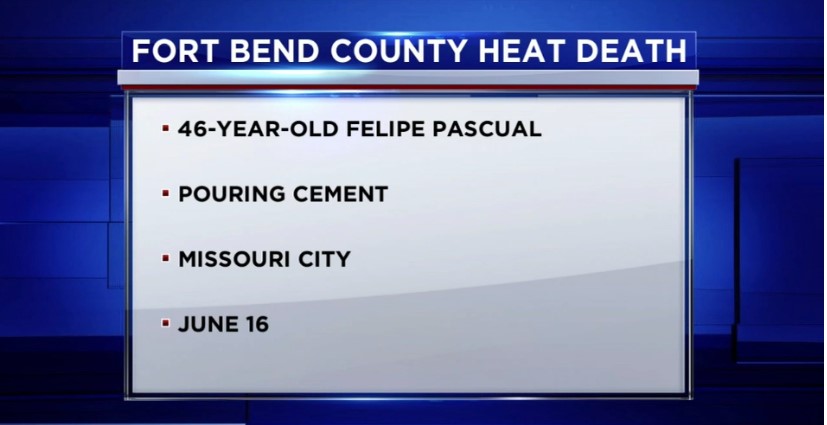Heat has killed another Texas worker.
The Galveston County Medical Examiner’s Office has confirmed that 46-year-old construction worker Felipe Pascual died on June 16 from heat stroke at Memorial Hermann Hospital Pearland, near Houston.
Deputies say Pascual was pouring concrete at Sienna Parkway and Waters Lake Boulevard in Missouri City when he collapsed due to the extreme heat.
He was taken to the hospital and pronounced dead in the emergency room.
The medical examiner’s office released Pascual’s cause of death this week, confirming he died from hyperthermia. Officials said Pascual didn’t have any underlying health issues.
Pascual’s death comes just a couple of weeks after Texas Governor Greg Abbott signed the “Death Star” bill, officially known as the “Texas Regulatory Consistency Act,” that would repeal ordinances in Dallas and Austin requiring heat and water breaks for construction workers as of September 1. Texas has been hit by a severe heat wave that has caused least 13 people to die from heat-related illness in the state and emergency room visits have spiked.
Just days after signing the bill, two workers in Texas — a postal worker and an electrical lineman — died of heat-related illness.
Although the legislation signed by Abbott would not have affected Pascual, who died near Houston, it’s hard to believe that Abbott — or any Governor in similar circumstances — would not be expanding heat protections for the state’s workers, instead of repealing them.
Although the legislation signed by Abbott would not have affected Pascual, who died near Houston, it’s hard to believe that Abbott — or any Governor in similar circumstances — would not be expanding heat protections for the state’s workers, instead of repealing them. Supporters of the legislation claim that the bill will “provide statewide consistency by returning sovereign regulatory powers to the state,” which — for Texas Republicans — is apparently much more important than saving workers’ lives.
Things were already bad in Texas
Since 2010, at least 53 Texas workers have died of heat-related illness, according to NPR and Columbia Journalism Investigations. Climate change has made the Texas heat worse. A report from the state’s climatologist estimates that the number of 100-degree days is expected to nearly double by 2036 compared to 2001-2020.
And its even worse for some groups of particularly vulnerable workers. “Advocates for worker protections point to especially vulnerable populations that call Texas home, including low-income and Latino immigrants who are less likely to communicate their discomfort or illness on the job.”
More background on Abbott’s actions here.
Information from OSHA about how to protect workers from heat illness can be found here.
